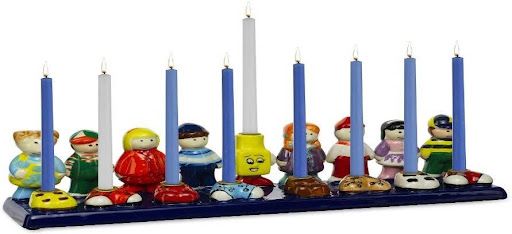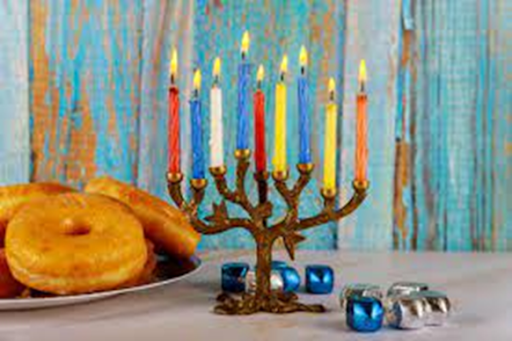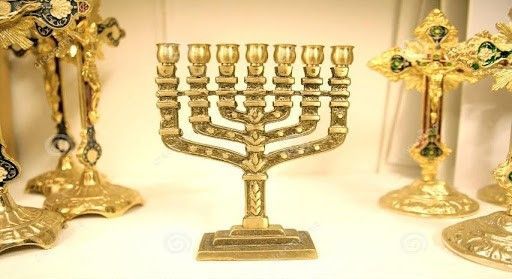Hanukkah (Festival of Lights)
December 25, 2024 - January 2, 2025, is Hanukkah (Festival of Lights)
Some people have referred to the Jewish holiday of Hanukkah or Chanukah as a “Jewish Christmas.” It isn’t. It has nothing to do with Christ or Christmas. It is the eight-day Jewish celebration that commemorates the rededication of the second temple in Jerusalem during the Maccabean Revolt against the Greek empire. Often called the Festival of Lights, the holiday is celebrated with the lighting of the menorah, traditional foods, games, and gifts.
Antiochus IV began his reign 174 B.C., and he was a greedy tyrant who took the title, Epiphanes, meaning “the gods’ beloved.” Humility wasn’t one of his strong points. One historian thought that the title, “Epimanes” would be more appropriate. This word means “madman.”
The Greeks were occupying Israel at this time and needed money to pay for their continuing military conquests. Meanwhile, the Jews had quite a bit of wealth stored in the temple. It stored the annual temple tax as well as funds for the needy. The temple served as a place of worship and a bank. Can you guess where the story is going from here?
Antiochus IV (the “god’s beloved” or “madman”) also wanted to unite his empire under one religion. If everyone was of one mind with regards to religion, there would be fewer conflicts among his people. Everyone was to think and worship alike, including the Jews. In 168 B.C. he outlawed the Jewish religion and his troops descended on Jerusalem. They massacred thousands of people and desecrated the Second Temple. They offered a pig to the pagan god Zeus on the altar in the temple, poured broth from the pig onto the sacred scrolls and burnt them. This did not win the hearts and minds of the Jews.
A group of Jews called the Maccabees, led by Judah Maccabee, fought a two-year guerilla war against the occupiers and liberated the temple. They cleaned up the temple, rebuilt its altar and built a new menorah. The original, made of gold, was stolen by the Greeks. The new one had nine branches. Each day of Hanukkah they would light one oil lamp. The oil lamp in the middle was used to light the other eight. So brilliant was Judah Maccabee as a military strategist, there’s a statue of him at the U.S. Army Military Academy at West Point.
The miracle of Hanukkah is that they only had enough sacred oil to last one day, but it lasted eight days. Or maybe it didn’t. In the book of Maccabees, there is no mention of an oil shortage. The story doesn’t appear until six centuries later when Hanukkah is mentioned in the Talmud.
If the miracle didn’t happen, why did the Jews celebrate the rededication of the temple for eight days? Because they had been fighting the Greeks in the autumn and they couldn’t celebrate the eight-day festival of Sukkot (Feast of Tabernacles).
In 2023 Hanukkah is observed from December 7 to December 15. How do Jews celebrate Hanukkah? By saying some prayers, of course, and eating fried foods such as potato pancakes and jam-filled donuts. Why fried foods? Fried foods remind them of the oil used in the menorah. I guess you could eat French fries, instead. Other customs include playing with a four-sided spinning top called a dreidel and exchanging gifts. Menorahs are oftentimes displayed in windows to remind others of the miracles of the lights.
In recent decades, particularly in North America, Hanukkah has exploded into a major commercial phenomenon, largely because it falls near or overlaps with Christmas. From a religious perspective, however, it remains a relatively minor holiday that places no restrictions on working, attending school or other activities. In sympathy with the Jews, we can go to the local donut shop and enjoy donuts and coffee without any guilt.
Jesus celebrated this holiday, though not necessarily with donuts. John 10:22 says, “And it was at Jerusalem the feast of the dedication, and it was winter.” This dedication refers to Hanukkah.
Unlike the temple lamp, the Hanukkah menorah isn’t mentioned in Scripture, so the designs vary considerably, from the whimsical to the more serious.


The candelabra in the temple (below) has seven oil lamps on it, not the nine seen in the Hanukkah lamp. The seven lamps speak of the seven days of creation and the one in the middle represents the Sabbath.

Happy Hanukkah! Merry Christmas!
Recent Articles
Share this:
Start Here...
Why Study the Bible?
Don’t many consider the Bible to be just a book of myths? Why do we read the Bible rather than the sacred literature of other religions?
How do we know that it is from God? How do we know that what we have today is an accurate translation from the original? Is the Bible complete or have there been some books that have been lost?
We should be able to answer these questions, and there are answers! So start here!
Answers to Common Bible Questions

Lent is a six week period of spiritual devotion starting on Ash Wednesday and ending at Easter. Those who observe Lent usually give up something for Lent. Some might give up coffee, or soda pop, or alcohol, or chocolate. May I suggest that you give up something that will really impress God and make this season of Lent one of the most memorable and meaningful seasons of your life? May I suggest that if you are giving up something, why not give up some of the acts of our sinful nature mentioned in Gal. 5:19? Why don’t we give up lying about others? Do you think you can give up the hate you feel towards others? How about envy, can we work on putting envy aside this year? How about giving up on the naïve idea that all pastors are mature Christian leaders whose word should always be accepted, rather than wolfs in sheep’s clothing (Matt 7:15). How about giving up the idea that everyone in church is a real Christian (Matt 7:21-23). How about giving up your desire to seek revenge on those who have hurt you (Matt 18:21-22)? If you are insecure and feel threatened when you see the success of others in ministry, how about giving up efforts to hinder others who have been called to minister (Rom 12:4-8)? Of course it is easier to give up something like chocolate, etc. and make yourself feel like you are doing something that is pleasing to God. If you are not willing to give up unchristian behavior, might I suggest something that will really please God this Lent? Give up all evidence of your profession of Christian faith, such as books, pictures and jewelry. Don’t talk about God, Jesus or the Church. I think God would appreciate it if you would stop giving HIM a bad name by the way you live. Let’s give up what hinders our witness and become a better ambassador for Christ (2 Cor 5:20) this Lenten season.

In Matthew 2:1-2 is says that the magi saw "His star in the east." What was this star that guided these men to Jesus? Some have suggested that it could have been a comet, an asteroid, or perhaps a meteor or an especially bright star. The problem with these suggestions is that these physical things either quickly move across the sky and then disappear or are too far away to provide directions with any precision. It would be hard to get directions from such objects. The "star" had to move constantly or intermittently at the same pace as the magi. Then it says that it hovered over the house where Mary and Joseph had moved to with Jesus. It hardly sounds like a comet or meteor or a star as we know them. Can you think of another time that people in the Bible were guided by some form of light? How about the time when Moses was leading the Israelites out of Egypt? He didn't have a global positioning system with him. He did have a pillar of fire that led him at night (Ex 13:21-22). We see this light in Solomon's Temple (2 Chron 7:1-3) and when the Jews were about to go into Babylonian captivity, we see it leaving the Temple (Ezek 9-11). In the New Testament we see it at the birth of Jesus (Luke 2:9) at His transfiguration (Matt 17:5) and His ascension (Acts 1:9). What exactly was this guiding light? The word "star" can also be translated as "radiance." It appears that it was this "radiance" that guided Moses and the magi. The Jews call this the "Shekinah", a physical manifestation of the glory of God in the form of a supernatural radiance. This, I believe, is what the Star of Bethlehem was.

Imagine that you are the pastor of a church. A young married couple is having some difficulties in their relationship and they seek counsel from you. On Monday the wife comes in to give her assessment of their marriage. What do you think she will say? She might say that she is a hardworking, caring and supportive wife and that it is her husband who is the neglectful, insensitive brute and the source of all problems in the marriage. You feel so sorry for this wife and when you see her husband in the hallway, you think to yourself, "What a jerk." On Friday the husband comes in and gives his assessment of the marriage. He tells you that he is hard working and very generous and that she is the major problem in the relationship. As the pastor, you are wondering if they both are talking about the same marriage. Each person tells you what makes them look best and their spouse the worst. Where is the truth? The truth is probably somewhere in between Proverbs 18:17 says, "The first to present his case seems right, til another comes forward and questions him." There are conflicts in all relationships, between spouses, parents and children, employees and employers. When you hear one side of a story, don’t assume that what you hear is the complete truth. And don’t pass on to someone else what you have heard. Probably, at least some of what you heard is untrue to gain your support in a conflict.


